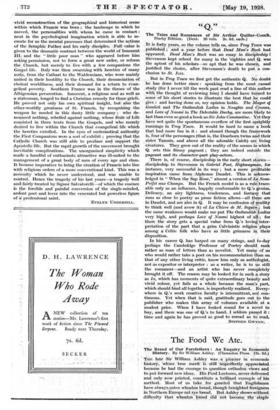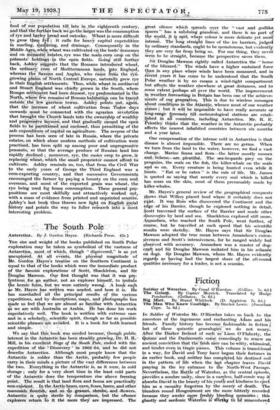The Food We Ate.
Tim late =Sir- William Ashley was PiOneer in economic 4lizige. true Merit is. stlll iiiitieffeetly -appreciated_ because he had the courage to .question orthodox -views and to put forward new ideas. - His Ford Lectures, never delivered and only now printed-, constitute a brilliant example of his method. Most of us take fOr granted that Englishmen have alwayseaten wheaten bread, though benighted foreigners in Northern.Europe eat rye bread. But Ashley shows without difficulty that Wheaten 'bread did not becOine the-staple. food of our population till_ late in the eighteenth century, and that the further back we the larger was the consumption of rye and barley kread and oatcake, Wheat is more difficult to grow than r; it calls for heavy capital expendidire in marling, illannring, and drainage. Consequently in the Middle Ages,..whilgswheat was cultivated on the lords' demesnes and on ricionestie estates, rye was the main corn crop on-die patients' holdings :in the open fields. Going still further back, Ashley suggests that the Romans introduced wheat, the ordinary ,corn of Mediterranean ler+,into Englapti, whereas the SaxOns and Angles, who came from the rye- growing plains of North Central ,Eiirope, natwally_ grew rye in their English settlements; Thus, while wheat in. mediaeval and Stuart England was -chiefly grown in the South, where Rontan settleMent had been dewiest, rye predominated in the North, where few remains' of ROman habitation can be treeed outside- the few gariiion'toWns. Ashley points. out again, that the increase . of wheat cultivation from fudor :days onwards .muet be connected with the agrarian revolution that brought the Cluirch,lands into the ownership of wealthy and progressive laymen; and that gradually caused the Open' fields to be partitioned-' and enclosed; thils permitting of the safe exPenditure of eaPital agr icrilture. The reverse of the process has been 'seen- of late in Russia, where the private estates, on which alone modern methods of cultivation were practised; has been split up among poor and unprogressiVe peasants; so that the average produce of Russian land has rapidly declined ; moreover, rye, the easier crop, to grow,* replacing wheat, which the-small proprietor cannot affOrd to cultivate. Ashley reminds us, too, that from the Civil War to the early years of George the Third England was a Corn-exporting country, and that successive Governments encouraged the farmer by paying a bounty on the corn sent overseas, and most of the exported grain was wheat, the rye being used for home consumption. These general pro- positions are most skilfully and attractively Worked,- outl with a mass of evidence from printed and unprinted sources. bley's last book thus throws new light on English 0cial ry and points the way to fuller research-info- most problem.



































 Previous page
Previous page